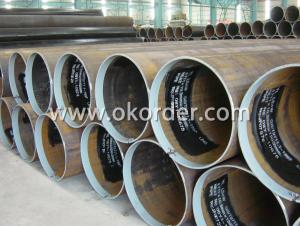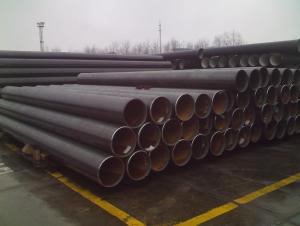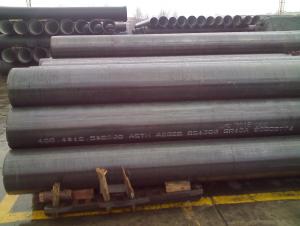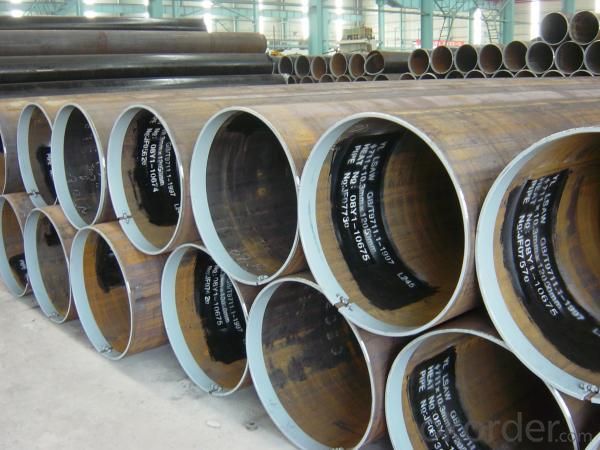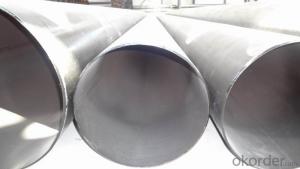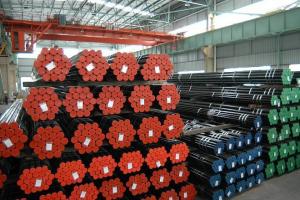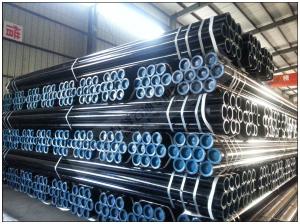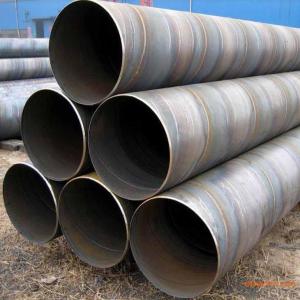API 5L LSAW Welded Steel Pipes
- Loading Port:
- China Main Port
- Payment Terms:
- TT / L/C
- Min Order Qty:
- 50MT m.t.
- Supply Capability:
- based on order m.t./month
OKorder Service Pledge
OKorder Financial Service
You Might Also Like
API 5L LSAW Welded Steel Pipes
Application of API 5L LSAW Welded Steel Pipes:
It is widely applied to line pipe and casing and tubing in oil transportation and casing field, and it is used in Low,high pressure liquid and gassy transportation and it is also good Structure pipe (for furniture, window, door, building , bridge, mechanical etc).
Package of API 5L LSAW Welded Steel Pipes:
Bundles with anti-rust painting and with plastic caps.
Standard of API 5L LSAW Welded Steel Pipes:
API SPEC 5L, API SPEC 5CT, ASTM A53, GB/T9711.1
Steel Grade of API 5L Line Pipes:
API SPEC 5L: B, X42, X46, X52, X56, X60, X65
API SPEC 5CT: J55, K55, N80, L80-1
ASTM A53: A, B, C
GB/T9711.1:L242、L290、L320、L360、L390、L415、L450
Mechanical Properties
|
Standard |
Grade |
(MPa) |
(MPa) | ||
|
Yield strength |
Tensile Strength | ||||
|
API SPEC 5L |
PSL1 | ||||
|
B |
≥241 |
≥414 | |||
|
×42 |
≥290 |
≥414 | |||
|
×46 |
≥317 |
≥434 | |||
|
×52 |
≥359 |
≥455 | |||
|
×56 |
≥386 |
≥490 | |||
|
×60 |
≥414 |
≥517 | |||
|
×65 |
≥448 |
≥531 | |||
|
×70 |
≥483 |
≥565 | |||
|
PSL2 | |||||
|
|
Min |
Max |
Min |
Max | |
|
B |
241 |
448 |
441 |
758 | |
|
×42 |
290 |
496 |
414 |
758 | |
|
×46 |
317 |
524 |
434 |
758 | |
|
×52 |
359 |
531 |
455 |
758 | |
|
×56 |
386 |
544 |
490 |
758 | |
|
×60 |
414 |
565 |
517 |
758 | |
|
×65 |
448 |
600 |
531 |
758 | |
|
×70 |
483 |
621 |
565 |
758 | |
Chemical Composition(%)
|
Standard |
Grade |
C |
Mn |
P |
S |
CEV |
|
Max |
Max |
Max |
Max |
Max | ||
|
PSL1 |
- | |||||
|
B |
0.26 |
1.2 |
0.030 |
0.030 | ||
|
×42 |
0.26 |
1.3 |
0.030 |
0.030 | ||
|
×46,×52,×56,X60 |
0.26 |
1.4 |
0.030 |
0.030 | ||
|
X65 |
0.26 |
1.45 |
0.030 |
0.030 | ||
|
X70 |
0.26 |
1.65 |
0.030 |
0.030 | ||
|
PSL2 |
0.43 | |||||
|
B |
0.22 |
1.20 |
0.025 |
0.015 | ||
|
×42 |
0.22 |
1.30 |
0.025 |
0.015 | ||
|
×46,×52,×56, X60 |
0.22 |
1.40 |
0.025 |
0.015 | ||
|
X65 |
0.22 |
1.45 |
0.025 |
0.015 | ||
|
X70 |
0.22 |
1.65 |
0.025 |
0.015 | ||
Raw Materials
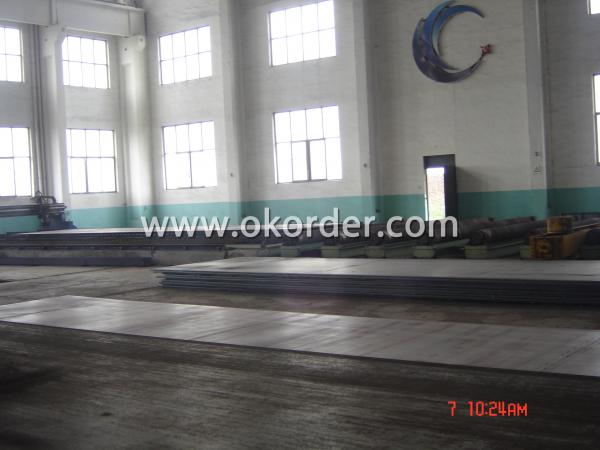
Bending& Forming
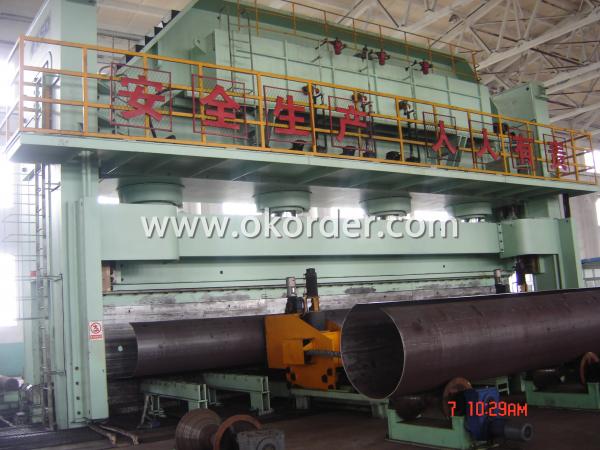
Welding Line
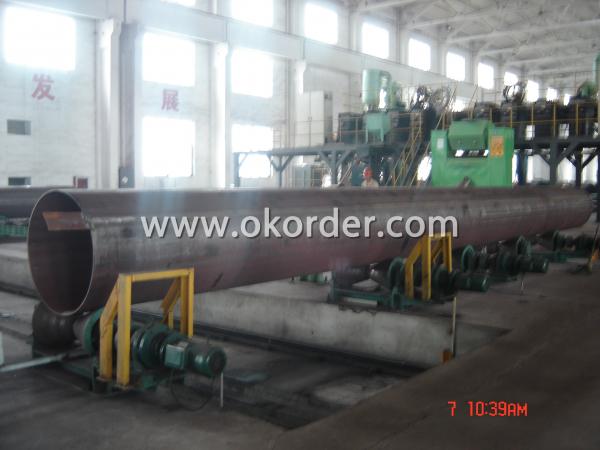
Materials Analysis Machine
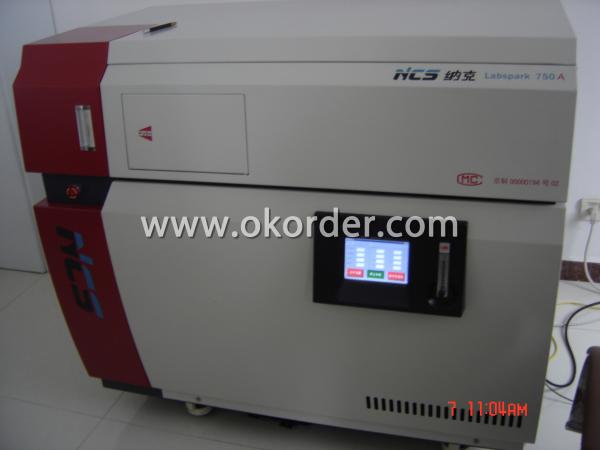
- Q: What are the different methods of pipe lining for steel pipes?
- Pipe lining for steel pipes can be done using various methods, each with its own unique features and benefits. These methods include: 1. Spray lining: A specially formulated coating is sprayed onto the inside of the steel pipe, creating a protective barrier against corrosion and chemical damage. Spray lining is a popular choice for smaller pipes due to its cost-effectiveness and quick installation. 2. Cured-in-place pipe lining (CIPP): This method involves inserting a flexible liner into the steel pipe and then curing it in place using steam or hot water. CIPP restores the pipe's structural integrity and is commonly used for larger pipes without the need for excavation. 3. Slip lining: By inserting a slightly smaller diameter pipe into the existing steel pipe and filling the space between them with cementitious material, slip lining rehabilitates pipes with minor defects and extends their lifespan. 4. Fold-and-form lining: A flexible liner is inserted into the steel pipe and expanded to its diameter using mechanical or hydraulic processes. The liner is then folded and formed to fit the pipe's contours before being cured in place. Fold-and-form lining is suitable for pipes with irregular shapes or bends. 5. Coating lining: A protective coating is applied to the inside surface of the steel pipe using spraying, brushing, or rolling methods. This coating acts as a barrier against corrosion and chemical damage and is commonly used for large pipes or those in harsh environments. Each method has its own advantages and disadvantages, and the selection will depend on factors such as pipe diameter, condition, budget, and project requirements. Consulting with a professional pipe lining contractor is crucial to determine the most suitable method for a specific steel pipe rehabilitation project.
- Q: What are the advantages of using pre-fabricated steel pipes?
- There are several advantages of using pre-fabricated steel pipes. Firstly, they offer superior strength and durability, making them resistant to extreme weather conditions and corrosion, resulting in longer lifespan. Secondly, pre-fabricated steel pipes can be manufactured to precise specifications, ensuring easy installation and reducing construction time and costs. Additionally, they provide excellent structural integrity, which makes them ideal for carrying heavy loads and withstanding high pressure. Lastly, pre-fabricated steel pipes are eco-friendly as they are recyclable, contributing to sustainability and reducing environmental impact.
- Q: Can steel pipes be used in extreme weather conditions?
- Steel pipes are suitable for use in extreme weather conditions because they are known for their high strength and durability. This makes them applicable in construction, infrastructure, and transportation. Steel pipes are commonly used to transport fluids and gases across industries and are specifically designed to withstand harsh environmental conditions such as extreme temperatures, high pressures, and corrosive environments. Even in extreme weather conditions like intense heat, cold, or heavy rain, steel pipes can maintain their structural integrity and functionality. Moreover, they can be coated or insulated to provide extra protection against corrosion and maintain desired temperatures. In conclusion, steel pipes are a dependable option for extreme weather conditions due to their strength, durability, and ability to resist various environmental factors.
- Q: Can steel pipes be used for transporting gases and liquids?
- Yes, steel pipes can be used for transporting gases and liquids. Steel pipes are commonly used for this purpose due to their durability, strength, corrosion resistance, and ability to withstand high pressures. Additionally, steel pipes are versatile and can be customized to meet specific requirements for different types of gases and liquids.
- Q: Can steel pipes be used for fire protection systems?
- Yes, steel pipes can be used for fire protection systems. Steel pipes have high heat resistance and can withstand extreme temperatures, making them suitable for carrying water, foam, or other fire suppressants in fire protection systems. Additionally, steel pipes are durable, strong, and have a long lifespan, making them a reliable choice for fire safety applications.
- Q: What's the difference between the fastener type steel pipe scaffold, the floor type steel pipe scaffold and the overhanging type steel pipe scaffold?
- It is made up of steel pipe, fastener, base, foot board, safety net and so onSteel pipe rod: generally there are two kinds, an outer diameter 48mm, wall thickness 3.5mm; another kind of outer diameter 51mm, wall thickness 3mm; according to its location and function is different, can be divided into vertical pole, horizontal rod, sweeping rod, etc..Fasteners: fastener is the connection between the steel tube and steel tube, which has three forms, namely the right angle fastener, rotating fastener, butt joint fastener: rectangular fastener for connecting the two vertical pipes, it depends on the friction between the fastener and the steel pipe to transfer load. Swivel fastener: used for connecting two steel tubes intersecting at any angle.
- Q: What are the different types of steel pipe valves?
- There are several different types of steel pipe valves that are commonly used in various industries and applications. Here are some of the most common types: 1. Gate valves: These valves are designed to control the flow of fluid by lifting or lowering a gate or wedge that obstructs the flow path. They provide a tight seal when closed and are commonly used in applications that require a full flow or complete shut-off. 2. Globe valves: Globe valves have a globe-shaped body and a movable plug or disc that regulates the flow of fluid. They offer good throttling capabilities and are used in applications where precise control of flow is required. 3. Ball valves: Ball valves use a rotating ball with a hole in it to control the flow of fluid. When the hole is aligned with the pipe, the valve is fully open, and when the hole is perpendicular to the pipe, the valve is closed. Ball valves are durable, reliable, and commonly used in applications that require quick and easy shut-off. 4. Check valves: Check valves allow fluid to flow in only one direction and prevent backflow. They are often used to prevent damage to pumps, compressors, and other equipment by preventing reverse flow. 5. Butterfly valves: Butterfly valves have a disc that rotates within the pipe to control the flow of fluid. They are lightweight, compact, and offer a quick shut-off. Butterfly valves are commonly used in large-scale applications such as water treatment and HVAC systems. 6. Plug valves: Plug valves have a cylindrical or conical plug that rotates within the valve body to control flow. They are simple in design, easy to operate, and offer reliable shut-off capabilities. Plug valves are commonly used in applications that require frequent operation and high pressure ratings. 7. Diaphragm valves: Diaphragm valves use a flexible diaphragm to control the flow of fluid. When the diaphragm is pressed against the valve seat, the flow is blocked, and when the diaphragm is lifted, the flow is allowed. Diaphragm valves are commonly used in applications that require a sterile or hygienic environment. These are just a few examples of the different types of steel pipe valves available in the market. The choice of valve depends on the specific application requirements, such as flow rate, pressure, temperature, and the type of fluid being transported.
- Q: What are the advantages of using steel pipes in the manufacturing of furniture?
- There are several advantages of using steel pipes in the manufacturing of furniture. Firstly, steel pipes provide durability and strength, ensuring that the furniture is sturdy and long-lasting. Secondly, steel pipes have a sleek and modern appearance, adding a contemporary touch to the furniture design. Additionally, steel pipes are resistant to corrosion, making them suitable for both indoor and outdoor furniture. Lastly, steel pipes are versatile and can be easily shaped and welded, allowing for customization and flexibility in furniture design.
- Q: Can steel pipes be used for power plant construction?
- Yes, steel pipes can be used for power plant construction. Steel pipes are commonly used in power plants for various applications such as steam piping, water piping, and air/gas piping. They are preferred due to their strength, durability, and ability to withstand high temperatures and pressures. Steel pipes also have excellent corrosion resistance properties, which is crucial in power plant environments where different fluids and gases are transported. Additionally, steel pipes can be easily welded, allowing for efficient installation and maintenance. Overall, steel pipes are a reliable and cost-effective choice for power plant construction.
- Q: How are steel pipes used in the construction of power plants?
- Steel pipes are used in the construction of power plants to transport various fluids, such as water, steam, and fuel, throughout the facility. They are essential for ensuring a reliable and efficient flow of these substances, which are crucial for the operation of power generation equipment. Additionally, steel pipes are also used for structural support and to create ventilation and exhaust systems within the power plant.
1. Manufacturer Overview
| Location | Wuxi, China |
| Year Established | 1980 |
| Annual Output Value | Above Three Million To Five Million RMB |
| Main Markets | Main land |
| Company Certifications | Certificate of Conformity; API 5CT |
2. Manufacturer Certificates
| a) Certification Name | |
| Range | |
| Reference | |
| Validity Period |
3. Manufacturer Capability
| a) Trade Capacity | |
| Nearest Port | Shanghai |
| Export Percentage | 30%-40% |
| No.of Employees in Trade Department | 1400 People |
| Language Spoken: | English; Chinese |
| b) Factory Information | |
| Factory Size: | 1500 square meters |
| No. of Production Lines | Above 14 |
| Contract Manufacturing | CNPC;Sinopec Group |
| Product Price Range | Average |
Send your message to us
API 5L LSAW Welded Steel Pipes
- Loading Port:
- China Main Port
- Payment Terms:
- TT / L/C
- Min Order Qty:
- 50MT m.t.
- Supply Capability:
- based on order m.t./month
OKorder Service Pledge
OKorder Financial Service
Similar products
Hot products
Hot Searches
Related keywords
